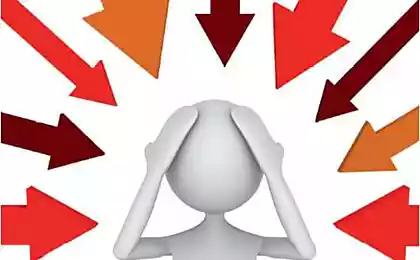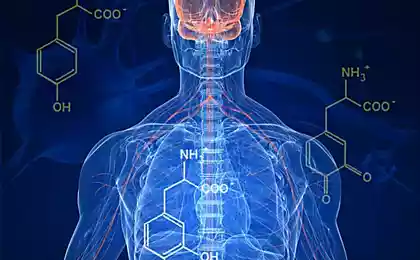496
3 types of automatic thoughts
All people on a subconscious level constantly spinning any thoughts, like music.
This music has a stronger impact on feelings than good health. Most people are not aware of this haunting verbal music until then, until you start to track your thoughts throughout the day.

Sometimes these people feel a slight shock from how their internal "write" infantile, demanding, and intolerant of objections.
Long tracking your thoughts, people notice the relationship between thoughts and feelings.
Automatic thoughts — a stream of thinking that exists in parallel with a more clear flow of thoughts. These thoughts are common to each of us. Often we are not aware of the automatic thoughts, although it's easy to learn.
For example, someone acquainted with the contents of this text might think: "I don't understand" and a little alarmed. However, it may spontaneously (i.e. unconsciously) to respond to this idea with more adaptive way: "I understand a lot; perhaps I should reread this Chapter again."
Let me give another example:
A man was reading a textbook on Economics, she had the following thoughts: "I don't understand". Then his thinking was even more categorical: "I'll never understand". He took these thoughts for truth and, of course, upset.
The task of the therapist to teach the client to identify such thoughts, to help to realize that they are dysfunctional and unproductive and to teach, through the use of cognitive skills, to find an adaptive response to such thoughts.
Although automatic thoughts occur all of a sudden, they can predict as they are subject to a certain picture of the world of man and are based on specific dysfunctional beliefs. The cognitive therapist seeks to identify a characteristic of the client's dysfunctional thoughts, which distort the perception of reality, cause negative emotions and/or hinder the achievement of goals.
Automatic thoughts are usually fleeting and fragmentary. Most people only aware of the emotion, which originated as a "response" to the idea. But the emotions that one experiences directly related to the content of automatic thoughts.
For example, she thinks: "I'm just a fool. I don't understand what the therapist has in mind," and it covers despair. Another time a girl thinks: "He looked at his watch. To him, I'm just one of the many" -and gets angry. And when her mind thought "What if the therapy doesn't help me? Where do I go?", europaweit anxiety.
Although automatic thoughts often take a shortened, "verbatim" form, a person can easily articulate them when the therapist asked him the meaning of these thoughts. For example, "Oh no!" can mean: "He (the therapist) gives me a very big homework." "Dammit!" can be an expression of this idea: "I forgot my book and will not be able to determine the date of the next session; I'm totally worthless."
Automatic thoughts can exist in verbal and visual form (images and representations), or both at once. In addition to verbal automatic thoughts, "Oh, no!" people can imagine themselves sitting at a Desk late at night and performing homework.
Automatic thoughts can be evaluated according to the criteria of reliability and benefits. Often automatic thoughts are distorted in some way and are contrary to the objective evidence.
There are accurate automatic thoughts, but the conclusion that man does, may be wrong. For example, "I have not fulfilled my promise" — it is a fair idea, but the erroneous conclusion that follows from it: "So rude of me".

The third type of automatic thoughts — that is true, but undeniably destructive ideas. For example, the young man was preparing for the exam, and he thought: "There is still a mountain of work. I don't finish before three o'clock in the morning". This idea is fair, but it leads to the fact that it increases anxiety, concentration and motivation decrease.
Rational response to this thought might be: "I really have a long time to do, but I can handle it. Has happened to me is. If I try to guess how long it takes to finish training, I will feel bad and finish even later. I'd rather try to concentrate on fulfilling one part of work and praise yourself when it is finished."
Evaluation of the reliability and/or benefits of automatic thoughts and adaptive response to them usually result in a significant improvement of the emotional state.
So, automatic thoughts exist alongside the more explicit and obvious flow of thought, arise spontaneously ine based on reflection or deliberation. People are often increasingly aware of the emotions associated with specific automatic thoughts than actually thought. However, it's easy to learn.
Automatic thoughts trigger specific emotions depending on the content. They are often short and fleeting and can take verbal and/or shaped. People usually accept their automatic thoughts as the truth, without thought or sober their assessments. Identifying and evaluating automatic thoughts, and rational (adaptive) response to them contribute to the improvement of health. published
Author: Kateryna Panova
P. S. And remember, only by changing their consumption — together we change the world! ©
Source: www.b17.ru/article/13793/
This music has a stronger impact on feelings than good health. Most people are not aware of this haunting verbal music until then, until you start to track your thoughts throughout the day.

Sometimes these people feel a slight shock from how their internal "write" infantile, demanding, and intolerant of objections.
Long tracking your thoughts, people notice the relationship between thoughts and feelings.
Automatic thoughts — a stream of thinking that exists in parallel with a more clear flow of thoughts. These thoughts are common to each of us. Often we are not aware of the automatic thoughts, although it's easy to learn.
For example, someone acquainted with the contents of this text might think: "I don't understand" and a little alarmed. However, it may spontaneously (i.e. unconsciously) to respond to this idea with more adaptive way: "I understand a lot; perhaps I should reread this Chapter again."
Let me give another example:
A man was reading a textbook on Economics, she had the following thoughts: "I don't understand". Then his thinking was even more categorical: "I'll never understand". He took these thoughts for truth and, of course, upset.
The task of the therapist to teach the client to identify such thoughts, to help to realize that they are dysfunctional and unproductive and to teach, through the use of cognitive skills, to find an adaptive response to such thoughts.
Although automatic thoughts occur all of a sudden, they can predict as they are subject to a certain picture of the world of man and are based on specific dysfunctional beliefs. The cognitive therapist seeks to identify a characteristic of the client's dysfunctional thoughts, which distort the perception of reality, cause negative emotions and/or hinder the achievement of goals.
Automatic thoughts are usually fleeting and fragmentary. Most people only aware of the emotion, which originated as a "response" to the idea. But the emotions that one experiences directly related to the content of automatic thoughts.
For example, she thinks: "I'm just a fool. I don't understand what the therapist has in mind," and it covers despair. Another time a girl thinks: "He looked at his watch. To him, I'm just one of the many" -and gets angry. And when her mind thought "What if the therapy doesn't help me? Where do I go?", europaweit anxiety.
Although automatic thoughts often take a shortened, "verbatim" form, a person can easily articulate them when the therapist asked him the meaning of these thoughts. For example, "Oh no!" can mean: "He (the therapist) gives me a very big homework." "Dammit!" can be an expression of this idea: "I forgot my book and will not be able to determine the date of the next session; I'm totally worthless."
Automatic thoughts can exist in verbal and visual form (images and representations), or both at once. In addition to verbal automatic thoughts, "Oh, no!" people can imagine themselves sitting at a Desk late at night and performing homework.
Automatic thoughts can be evaluated according to the criteria of reliability and benefits. Often automatic thoughts are distorted in some way and are contrary to the objective evidence.
There are accurate automatic thoughts, but the conclusion that man does, may be wrong. For example, "I have not fulfilled my promise" — it is a fair idea, but the erroneous conclusion that follows from it: "So rude of me".

The third type of automatic thoughts — that is true, but undeniably destructive ideas. For example, the young man was preparing for the exam, and he thought: "There is still a mountain of work. I don't finish before three o'clock in the morning". This idea is fair, but it leads to the fact that it increases anxiety, concentration and motivation decrease.
Rational response to this thought might be: "I really have a long time to do, but I can handle it. Has happened to me is. If I try to guess how long it takes to finish training, I will feel bad and finish even later. I'd rather try to concentrate on fulfilling one part of work and praise yourself when it is finished."
Evaluation of the reliability and/or benefits of automatic thoughts and adaptive response to them usually result in a significant improvement of the emotional state.
So, automatic thoughts exist alongside the more explicit and obvious flow of thought, arise spontaneously ine based on reflection or deliberation. People are often increasingly aware of the emotions associated with specific automatic thoughts than actually thought. However, it's easy to learn.
Automatic thoughts trigger specific emotions depending on the content. They are often short and fleeting and can take verbal and/or shaped. People usually accept their automatic thoughts as the truth, without thought or sober their assessments. Identifying and evaluating automatic thoughts, and rational (adaptive) response to them contribute to the improvement of health. published
Author: Kateryna Panova
P. S. And remember, only by changing their consumption — together we change the world! ©
Source: www.b17.ru/article/13793/
Magnesium deficiency in the body: find out what threatens and what to do
Muscular armor: exercise to relieve tension in the pelvic region






















